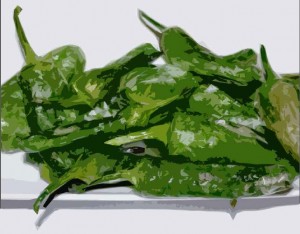El español, lengua de sabores | Spanish, a language of flavours
El español, lengua de sabores
Programa :Noviembre 2014
En español – Auditorio del Instituto Cervantes de Londres e Hispania
EL ESPAÑOL, LENGUA DE SABORES
Podría decirse que el segundo sentido que más se emplea cuando se viaja al extranjero es el del gusto. Después de etiquetar a grandes rasgos la novedad y pasar a trazar diferencias y similitudes entre gentes y lugares, el nuevo destino se debe también catar. Así, cada país tiene una historia, bandera y características arquitectónicas, pero también un sabor distintivo.
Hay una tendencia creciente en el campo de la gastronomía mundial, a la que podemos agradecer la posibilidad de contar con infinitas realidades comestibles en cualquier coordenada geográfica: el ser humano, cuando viaja por placer, se rinde al imperio gastronómico del destino al que llega, pero cuando se muda a vivir allí, lleva el de su propio país por bandera. Cocinar sus platos siguiendo las recetas de sus antepasados le permite no perder sus raíces y mantener un pedazo de casa fuera de casa. Los demás, a su vez, llegan a entender su cultura de verdad a través del gusto.
España, a ojos ajenos, es el país del jamón serrano, la tortilla de patata y el aceite de oliva, entre otros. Su gastronomía, rica en influencias mediterráneas, promueve uno de los hábitos alimenticios más sanos del mundo. No es el idioma lo único que se conoce de la península ibérica; una vez cruzado el Pirineo, 17 comunidades autónomas despliegan sus abanicos gastronómicos en continuo crecimiento, a cual más complejo. Dentro de esas comunidades, un total de 50 provincias realiza piruetas locales que sorprenden y atraen a españoles y extranjeros por igual. En España es habitual reservar los días de puente para hacer rutas gastronómicas y enológicas por los cuadro puntos cardinales del país, y la competición por hacerse con el título no oficial de “mejor tapa”, “mejor postre”, “mejor plato”, “mejor vino” o “mejor sidra”, convierten las escapadas a destinos españoles en una auténtica delicia para los visitantes (la toña de Letur, un pueblo de Albacete de poco menos de 1300 habitantes que tiene un postre envidiado por todas las localidades vecinas, es un buen ejemplo. Si todavía no la has probado, solo la cata merece el viaje).
Es entre platos, tapas, postres, vinos y sidras que España ha abierto un nuevo capítulo en la guía mundial de gastronomía. Aquellos que lo deseen, pueden reservar una plaza para sumergirse en el multicultural carácter de España los viernes y sábados de noviembre, asistiendo al I Seminario HISPANIA de gastronomía española en Londres, organizado por el Instituto Cervantes Londres y el restaurante Hispania.
¿Cuál es el plato español estrella para ti? Deja tu comentario abajo.
Información e inscripciones: reservas.londres@cervantes.es | 0207 201 0752
Spanish, a language of flavours
Programme : November 2014
In Spanish
Auditorium Instituto Cervantes London and HIspania
One could say that the second most engaged sense upon traveling abroad is that of taste. After roughly labelling the novelty, then establishing some differences and similarities between people and places, the new destination ought to be tasted. Thus, every country has a history, a flag and singular architectural traits, but it also has a distinctive flavour.
There is a growing worldwide cuisine trend, to be thanked for allowing us to count on endless food-related realities in any given geographical location: our species, when they travel for pleasure, they surrender to the gastronomic empire of their destination. However, when they relocate to such destination, they fly their nation’s own culinary flag. Making their own dishes by following their ancestors’ recipes, allows them not to lose touch with their roots, thus keeping a piece of home away from home. The others, in turn, get to truly understand their host’s culture through taste.
Spain, in the eyes of the beholder, is the country of serrano ham, Spanish omelette and olive oil, among others. Spanish cuisine, rich in Mediterranean influences, is considered to foster one of the healthiest eating habits in the world. It is not only the Iberian language that is world-renowned; south of the Pyrenees, there are 17 autonomous communities showing off an ever-complex, ever-growing gastronomic range. Those communities are in turn made up by 50 provinces, each of which pulls off trademark cuisine stunts that surprise and attract Spaniards as well as foreigners. In Spain, it is a common habit to take advantage of bank holidays to enrol in food and wine-oriented trips throughout the country. Additionally, the unofficial competition to get the “best tapa”, “best dessert”, “best dish”, “best wine” or “best cider” badge, makes it delicious to take weekend breaks to any given Spanish destination. The toña, a dessert from Letur (a village in Albacete with a population of little under 1300) which is envied by all neighbour locations, is a good example. If you have not had it yet, only the tasting is worth the trip).
It is among dishes, tapas, desserts, wines and ciders that the Spanish heritage has started a new chapter in the world cuisine guide. Those interested can book a place to get immersed in the multicultural character of Spain, Fridays and Saturdays throughout November, by attending the I HISPANIA Spanish Cuisine Seminar in London, hosted by Instituto Cervantes London and the restaurant Hispania.
Which do you consider the Spanish star dish? Leave your comment below.
Information and enrolment: reservas.londres@cervantes.es | 0207 201 0752



